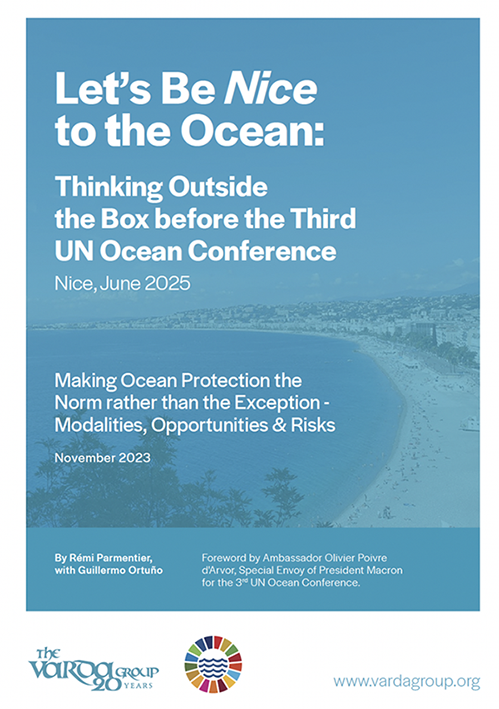By Rémi Parmentier, Co-director, The Varda Group
Eighteen months before the Third UN Ocean Conference opens in the city of Nice, France, in June 2025, we call for a mind shift in how the Ocean features in our collective understanding: will we come to understand it as a planetary system whose health we depend on for our survival? Or will we continue to regard it as a place of largely unlimited exploitation regardless of the consequences? We propose that the central question for this conference be: Can we make Ocean protection the norm rather than the exception?
This question is at the heart of a document we just released, in association with the Prince Albert II of Monaco Foundation, Dona Bertarelli Philanthropy, Thyssen-Bornemisza Art Contemporary Academy, the Tara Ocean Foundation, MedPAN, the Ocean Born Foundation, and the Ocean-Climate Platform titled, ‘Let’s be Nice to the Ocean: Thinking Outside the Box before the Third UN Ocean Conference.’
In it, we examine the possibilities of a paradigm shift whereby a ‘Protection Principle’ (a further evolution of the precautionary principle) could explicitly reverse the burden of proof. In other words, it would be incumbent upon extractive industries to demonstrate the harmlessness of their projects and actions rather than for ocean conservationists to continue begging for protection.

The deep sea is being voraciously eyed by mining companies. The Southern Ocean is a victim of climate change and overfishing. And the ocean more generally is experiencing increasing stresses due to soaring carbon dioxide (CO2) emissions and unprecedented warming. Collectively, we are exceeding the planetary boundaries of terrestrial, marine, and atmospheric systems beyond the safe operating space for humanity – and all species for that matter – and we are reaching the sort of tipping points that could lead to ecosystem regime shifts and collapses. Drastic changes to the Ocean and marine life are no longer just a threat, but a stark reality.
Absorbing approximately 90% of the excess heat and 25% of anthropogenic CO2 in the atmosphere, the Ocean is a critical buffer against climate change, and we are rapidly destroying that buffer. Just as we cannot fathom how our ancestors believed the Earth to be flat, our descendants will find it hard to understand how the ancestral interdependence between the oceansphere and the atmosphere was not evident in our minds from the start.
We acknowledge that achieving a paradigm shift of this magnitude cannot take place overnight. But we have identified three immediate opportunities:
- Governments can prevent now emerging deep sea mining technologies from being deployed;
- Governments can put their words into action and protect the Southern Ocean now; and
- Governments can update and strengthen the 50-year-old Mediterranean Sea regional governance regime to test if members of the global North and global South can apply the protection principle together.
We propose that, from 2025 onwards, the billions of dollars currently wasted each year in public finances on sectors and activities that damage biodiversity should be redirected towards protection and sustainable management in conformity with Target 18 of the Kunming-Montreal Global Biodiversity Framework (GBF) of December 2022. We also propose that the elimination of solid, liquid, and airborne wastes that poison the Ocean be planned in earnest, that Ministries of the Ocean supplied with resources and power be set up at national level, and that the governance of transboundary and migratory marine biodiversity be strengthened.
In his foreword to the ‘Let’s Be Nice to the Ocean’ paper, Ambassador Olivier Poivre d’Arvor, President Emmanuel Macron’s Special Envoy for the Third UN Ocean Conference, emphasizes the need to “overturn the current paradigm of exploitation in favor of protection.” A major agreement in Nice is needed, he says, informed by international scientists who will help drive the Conference and built by political leaders – but also, significantly, by local communities, peoples, users, and economic and financial actors. “It will not be simple because ‘business as usual’ and ‘blue/blue/blue’ (to paraphrase Greta Thunberg) are the routine, due to the inertia, of many organizations, including the most reputable ones. In Nice, we will therefore have to organize ourselves differently. Courageously, sustainably, profoundly, all together, with and for the Ocean. If we are not nice to the Ocean, the Ocean will not be nicer to us.”
Our purpose in initiating this conversation is to encourage others to join us in challenging the status quo with more creative and innovative visions and proposals, so that the transformative opportunity represented by the Nice Conference is not lost. To this end, simultaneously with the publication of the ‘Let’s Be Nice to the Ocean’ paper on the website of the Prince Albert II of Monaco Foundation, The Varda Group and partners launched a new digital platform, to invite the various stakeholders to share and discuss their own “ocean-nice” proposals. Received on a rolling basis, these proposals will complete the picture painted by the survey of the expectations of civil society organizations (CSOs) for the Third UN Ocean Conference which we undertook jointly with the Ocean & Climate Platform at the request of the French and Costa Rican co-presidency of the Nice Conference.
Some commentators will likely say that our transformative proposals go too far or are not realistic. We would like to respond by saying that the past successes of the environmental movement since the first UN Environment Conference in Stockholm in 1972 were only possible because people with daring visions did not hesitate to take risks and challenge the status-quo. Now, 50 years later, we know it was a mistake not to take them seriously.
As Nelson Mandela once said, “It always seems impossible, until it’s done.”